People warned against ‘voodoo’ cancer cures

The Philippine Society of Medical Oncology (PSMO) said these herbal supplements had no proven curative effects while the Food and Drug Administration (FDA) said it did not approve any herbal medicine or health supplement as a cure for cancer.
“That’s what I call voodoo medicine …. There is no viable alternative to mainstream cancer treatment,” Dr. Ellie May Villegas, PSMO vice president, said at a press conference sponsored by pharmaceutical companies Roche and Fresenius.
Dr. Oscar Gutierrez Jr., chair of the FDA Policy Planning Office, said at the briefing that the agency had approved a total of 650 food and dietary supplements—including 106 traditionally used herbal products like “lagundi” and 35 herbal medicines—but none of these were certified as cancer cures.
“We saw a dramatic increase in the viability of herbal medicines, food and supplements for cancer patients. Many of these … are very attractive to cancer patients due to their claimed quick results and for their low prices,” Gutierrez said.
“(But) the FDA has not approved any food and dietary supplement against cancer cases. Although in the form of tablet, liquid, or gels that give them a semblance of medicine, food and dietary supplements are not a replacement for drugs and medicine,” he added.
No curative effects
Gutierrez said these supplements were approved to support nutrition and health care but not as substitutes for mainstream health care and medicines.
“They have no therapeutic claims and no documented curative effects. Patients should always seek proper health care and treatment from their doctors,” he said.
Gutierrez said supplements were processed food products intended to complement the diet and should not be used as conventional food or as the sole food item.
“The FDA has issued circulars and administrative orders that put correct labeling for supplements to ensure that the products are not commercially sold or advertised with therapeutic claims. We make sure that these products carry the label `No approved therapeutic claims,’” he added.
“The FDA ensures safety as well as truthfulness and validity of label claims. These products do not have curative effects and testimonials or anecdotal information associated with healing and curing are not allowed,” Gutierrez said.
Bio-resonance
Villegas said some of the supposed treatments that the public should be wary about included bio-resonance therapies, oxygen treatment, colonic cleansing, “megadosing” of Vitamin C, antineoplastons and immuno-augmentation treatment.
She said herbal medicines might actually interfere with chemotherapy or medicines used in cancer treatment.
“Some herbs cause problematic interactions with chemo, causing blood pressure swings and other complications,” Villegas said.
“The effectivity of the medicine could be adversely affected or it could interfere with the potency of the drug,” she added.
However, Villegas said “complementary alternative medicines” could be used with anticancer drugs. They include acupuncture, music therapy and yoga.
Alternative treatment
“We understand that cancer patients want to try alternative treatment. Integrative oncology is a safe way for cancer patients to mix alternative therapies such as acupuncture, massage therapies, diet management, music therapy, meditation, or yoga alongside their standard cancer treatment,” Villegas said.
However, Villegas said these therapies could not treat tumors but only control physical and emotional symptoms.
“These methods should not be used alone to replace research-based and standard cancer treatment, but they can be used with them. It is important to retain proper cancer treatment to get best results,” she said.
PSMO president Felycette Gay Lapus said that while herbal supplements may seem appealing, patients should be vigilant that they were not being misled by false promises.
“We continue in our quest to arm the public with as much information as possible. Prevention and early detection are ultimate goals in decreasing the cancer incidence and increasing survival rates in the country,” Lapus said.
